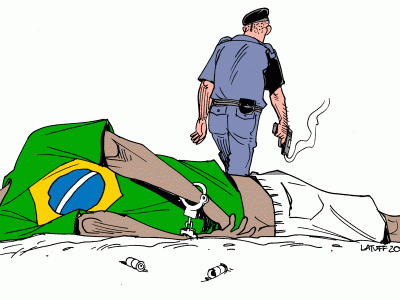To Shoot An Elephant é um documentário do espanhol Alberto Arce e do palestino Mohammad Rujailah, filmado em Gaza durante a guerra de um ano atrás. Para marcar o primeiro aniversário do fim da guerra, o filme, lançado sob a licença Creative Commons, foi mostrado em uma exibição especial por todo o mundo.
Hisham, um bloqueiro marroquino baseado na França, escreveu sobre o filme em seu blog the Mirror:
To Shoot an Elephant is a documentary by Alberto Arce and Mohammad Rujailah. They both accompanied a group of foreigners who managed to stay embedded with the Palestinian Red Crescent ambulances during the 21 days of Operation Cast Lead launched by Israel against the besieged Palestinian people of Gaza exactly one year ago. The assault started in December 27th, 2008, and lasted until January 18th, 2009. Horrific days of endless bombardments, random sniping of children, women, elderly, rescue workers – bombings of civilian areas, hospitals, ambulances, schools, mosques, UN headquarters that resulted in the killing of over 1,400 Palestinians, almost entirely civilians and the death of 13 Israelis. A global screening of the film was organized around the planet commemorating the first anniversary of the end of the assault.
The title is a reference to George Orwell’s essay during the years he was serving the British Empire as a police officer in Burma. Orwell’s witnessing of the horrors of imperial rule, the murderous absurdity that it entails, the level of human raw feelings of injustice that invariably transform into hatred, still holds to this day.
O título faz referência a um ensaio de George Orwell durante os anos em que ele serviu ao Império Britânico como um policial na Birmânia (Myanmar). Orwell foi testemunha dos horrores do regime imperial, o absurdo assassino que ele implica, o nível de sentimentos primários de injustiça que invariavelmente se transformam em ódio, ainda se mantém até hoje.
Os ativistas estrangeiros que participam do documentário incluem o italiano Vittorio Arrigoni que bloga no Guerrilla Radio [it], a canadense Eva Bartlett, e a britânica Ewa Jasiewicz.
Disponível para visualização em diferentes locais online, no YouTube ele pode ser visto em partes separadas; aqui está a primeira [en]:
O filme também foi divulgado no Second Life, o mundo virtual 3D.
Hisham assistiu uma projeção de To Shoot An Elephant em Paris:
People are justifiably moved by images coming from disaster-stricken areas of the world like Haiti hit by a horrific earthquake lately, but I guess the emotion is taken to a new level when the disaster is so conspicuously man-made, unjustifiable (indeed illegal), and avoidable. An overwhelming sense of anger together with feelings of injustice, helplessness and shock makes the experience even more compelling and engaging. I, for one, feared that the film would drift too much into a mere pornography of death and misery. I also was anxious to see whether the film would end up preaching for the converted. All in all it is a real, unformatted, unmanicured eye witness account about what really happens when ordinary people got bombed and collectively punished whether in Guernica, in Warsaw or in Gaza. And although, for the sake of preserving human dignity, I might have some contention about where the limits of filming agonizing people and dead bodies should lie, I still want to believe the film respected the suffering victims it happened to film.
Na Jordânia, Raghda Butros twittou depois de ver o filme:







